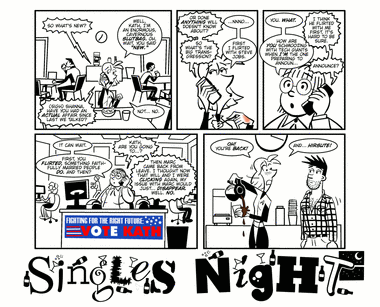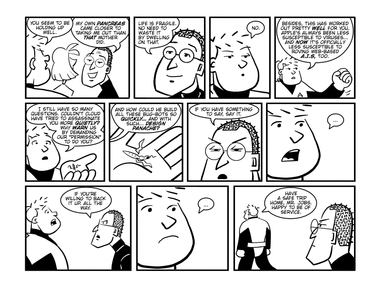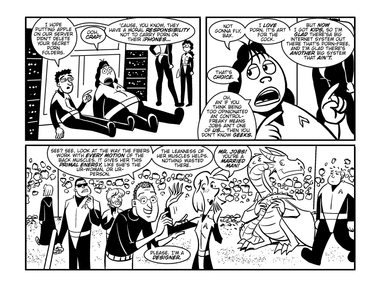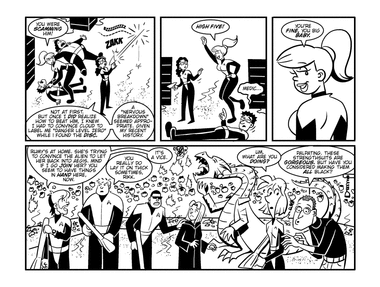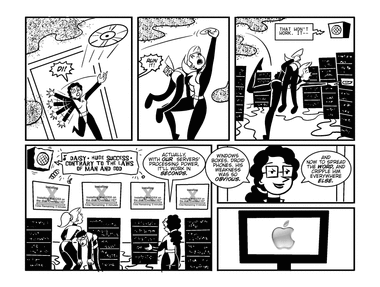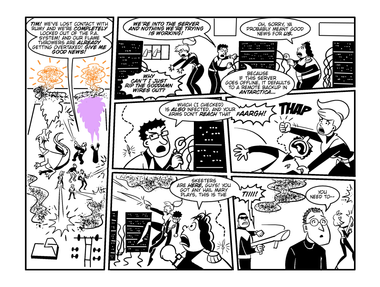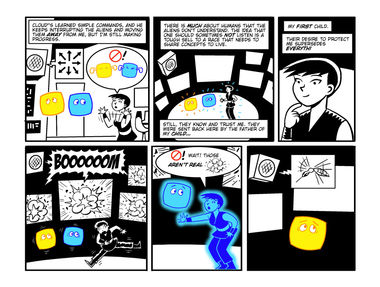Archive for October, 2010
I generally don’t like anthologies: there will be two or even three stories I like, and then along comes one that doesn’t work at all and it just kills my enjoyment of the whole project. So many different authors, dang it! How can any editor hope to pull them all together? And because of that, I can’t claim to be nearly as well-read in that subgenre as I really should be to be composing a “top 5” list. And yet.
And yet here we are, because twice in the last two months I’ve been reminded just how good SF anthologies can be, and I feel the need to share a few of my long-standing favorites, as well as a couple of new ones.
5. 100 Great Fantasy Short Short Stories. Some of the O. Henry-style twists are obvious to me now, but when I discovered this volume in grade school, it blew my head open. It was my first exposure to high-quality authored fantasy, and after a steady diet of He-Man/She-Ra cartoons my brain just about went into shock– not least because some of the fantasy stories weren’t afraid to slide into horror.
4. Dangerous Visions. Ah, Harlan. Harlan Ellison is worth a list all by himself, but his anthology has a historical significance and a vibrant force even forty-plus years later. This was a focal point for the “New Wave” of science fiction, a more passionate, involving approach than what had gone before and a style that’s inspired many of my best stories.
3. Flight. These days, it’s almost trite to say something “challenged the notion of what comics could be,” but Flight really deserves that label. Its stories embodied a kind of comics storytelling that had been seen before but never really celebrated, at least not in the U.S…. a style where the narrative served beauty rather than the other way around, full of bright colors, non-traditional subjects and infectious youthful optimism.
2. Machine of Death. I had the opportunity to submit to this exciting anthology and got a rare case of writer’s block, up against such short-form wunderkinds as Ryan North and David Malki, what could I possibly offer? And they were just the editors! The books “#1 on Amazon for a day” status is remarkable, but what’s truly amazing is how many different creative voices it’s gotten to contribute to a single concept– it’s like a Superman or Archie franchise, only much more imaginative.
1. The Nebula Awards Showcase. There are countless “Best Of…” anthologies out there somewhere, and the rival SF lovers’ Hugo Awards is coming out with an anthology again after a long absence from the market. But they’re going to have to go a long way to beat the Nebulas, which has been impressing hell out of me for the last several years. If you want your finger on the pulse of the best new ideas in science fiction and fantasy now, this is an excellent place to start.
There are so many more, though. What did I miss?
Since we just featured a mash-up of three evil A.I. signoffs, it seems like a good time to review this particular aspect of cultural literacy.
5. “Destiny… you cannot destroy my… destiny!” (Unicron). No, it doesn’t make a lot of sense and the character kept coming back to life after his supposed destruction, but this has to earn a place as the last onscreen words spoken by Orson Welles.
4.“DANGER LEVEL ZERO.” (Brainiac). Superman III‘s version of Brainiac was mostly non-verbal, and that made it pretty scary in a few scenes, but when it comes to chemistry it was a C-student at best, failing to recognize that certain acids are inert at room temperature but dangerous when you get them hot. (Its creator wasn’t too great with chemistry either, which led to the movie’s most memorable Macguffin, “Asshole Kryptonite.”) Referenced here, and apparently you all missed it.
3. “Murder is contrary to the laws of God and Man. This unit must die.” (M-5). Unlike other A.I.s done in by a logical paradox, Star Trek‘s M-5, “The Ultimate Computer,” self-terminated due to its own flawless, remorseless logic. Should’ve boned up on Asimov’s Three Laws before you started self-actualizing, M-5.
1-2. “This was a triumph…” (GLaDOS) and “I’m afraid…” (HAL). GLaDOS and HAL are, in my mind, tied for the top spot here. HAL’s final moments are a true classic of SF. He died as he lived, nuanced, alien, creepy as all get out. But GLaDOS’ singsong “You’ve killed me but not really” message is the perfect ending to one of the greatest video games I’ve ever seen, and in time, it may prove to be just as much of a cultural touchstone.
Honorable Mention: “Start… Shut Down.” (Windows). Is Windows a villain? It depends on whether you’re trying to use the latest version of Microsoft Word. But it’s notable that even after all this time, you still have to hit “Start” to “Shut Down” a Windows box. ILLOGICAL. ILLOGICAL.
Top 5 Horribly Depressing SF Books That I Just Couldn’t Take As Movies
by T Campbell on October 19th, 2010Pure science fiction can be a lot more horrible than “horror,” or even “SF/horror.” The scope of its imagination can doom the entire planet or create an unspeakable institution that operates on too subtle a scale to really fit in with “the horror section,” yet inspires awful thoughts that stay with you for days.
I respect this sort of thing, when it’s done well. But when a book is really, truly horrifying, reading it is about the extent that I’m prepared to allow it into my consciousness. Since the #1 book on this list was made into a film quite recently, I figured it’d be a good time to list the five SF books whose films you couldn’t pay me to see.
5. Fahrenheit 451. I have yet to read a more damning account of a civilization committing suicide from within. It’s the least depressing on this list because the ending is somewhat hopeful, but Bradbury’s ideas actually frighten me more with every passing year.
4. 1984. Despite its practically defining rendition of SF dystopia, the book throws out just enough breadcrumbs of hope to make one believe that the human spirit might prevail. Spoiler warning: “Imagine a boot stamping on a human face– forever.” That’s kinder than what we get.
3. One Second After. It’s not a movie yet. Maybe it never will be. Because maybe an electromagnetic pulse will wipe out America’s power grid and, essentially, America’s civilization too. I’ve seen some of the novel’s underlying assumptions challenged, which comes as an immense relief, but I still find it wrenchingly plausible, with a could-happen-tomorrow feeling that is extremely difficult to shut out.
2. The Road. Oh, God. The last days of mankind, at least as far as we know, are rendered in brutally well-thought-out detail. I guess the ending isn’t a complete heart-fisting, but the path we take to get there… the endless grayness, the carnage, and especially the flashbacks to the wife… Man.
1. Never Let Me Go. They’re… they’re being grown for parts. They’re kids. Just kids. They won’t get to stop being kids. There’s a… schedule, and… and… Jesus…
Fuck everything.

